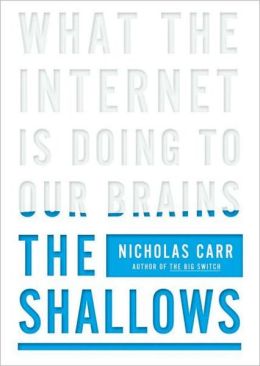
Widely heralded as the flashpoint for the ongoing debate over the power and peril of technology, The Shallows is Nicholas Carr's
best-selling exploration of the Internet's intellectual and cultural consequences. Part intellectual history, part popular science,
and part cultural criticism, The Shallows sparkles with memorable
vignettes—Friedrich Nietzsche wrestling with a typewriter, Sigmund Freud dissecting the brains of sea creatures,
Nathaniel Hawthorne contemplating the thunderous approach of a steam locomotive—even as it plumbs profound questions
about the state of our modern psyche. This is a book that will forever alter the way we think about media and our minds.
Quotes and thoughts while reading:
There were some shocking bits to read, and some non-surprising parts. It offers many little snippets, backed by research. Here are some of those snippets.
"When we go online, we enter an environment that promotes cursory reading, hurried and distracted thinking, and superficial learning. It's possible
to think deeply while surfing the Net, just as it's possible to think shallowly while reading a book, but that's not the type of thinking the
technology encourages and rewards." (p 116)
I acknowledge my own bias here, but this passage fits nicely with my world view. "By allowing us to filter out distractions, deep reading becomes a
form of deep thinking. The mind of the experienced book reader is a calm mind, not a buzzing one. When it comes to the firing of neurons, it's a mistake
to assume that more is better." (p 123)
When we are on the Internet, I think we are just becoming mindless consumers of data, there is no real reflection going on. There are just links to follow,
knowledge to be gained, and we follow them, one after another. This book talks about that our working memory, the "scratch paper" of the mind, can
only hold so many items, before it can file them away into long term memory. It is the filing of items into long term memory that allows us to think deeply,
to build new links in our brain, and to actually learn something. I fear that with mindlessly clicking links, hoping to suck in more knowledge we are just
constantly rewriting our scratch paper pad, never transferring that information into our long term memory.
We have also become skillful at a very superficial level (p 141). I can't tell you the number of times I have been asked to become an expert on something
in a matter of minutes. Yes, the Internet has the capacity to teach us amazing things, but for the given amount of time that people invest in learning a
skill through it (usually a very small amount of time) they can only become skillful at a superficial level.
As seems to happen in some books, the conclusion offers a wealth of information, which is rewarding since the reader worked so hard to get there. The idea
that "tools end up numbing whatever part of our body the amplify" (p 210) as stated by McLuhan is backed up in numerous ways. The questions we have to begin
asking arise. Is the Internet amplifying our minds, yet at the same time numbing it? Carr offers an answer, but I feel like we are too entrenched in the current
debate to look at it objectively. We will know in 10 to 15 years however.
"More information can mean less knowledge" (p 214)
"After Taylor, the laborer began following a script written by someone else. The machine operator was not expected to understand how the script was
constructed, or the reasoning behind it; he was simply expected to obey it... Conscious craft turned into unconscious routine. (p 218)
In closing: "It would be rash to jump to the conclusion that the Internet is undermining our moral sense. It would not be rash to suggest that as the
Net reroutes our vital paths and diminishes our capacity for contemplation, it is altering the depth of our emotions as well as our thoughts." (p 221)
© JKloor 2015 Books
